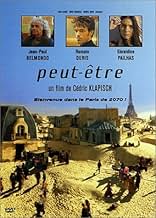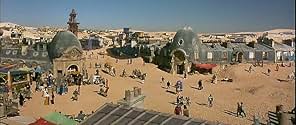CALIFICACIÓN DE IMDb
5.8/10
1.8 k
TU CALIFICACIÓN
Después de mantener relaciones con su novia Lucie en un baño, Arthur descubre que un panel de techo es un portal temporal a París en el futuro, aunque en ese momento parece más una ciudad de... Leer todoDespués de mantener relaciones con su novia Lucie en un baño, Arthur descubre que un panel de techo es un portal temporal a París en el futuro, aunque en ese momento parece más una ciudad desértica bañada por el sol.Después de mantener relaciones con su novia Lucie en un baño, Arthur descubre que un panel de techo es un portal temporal a París en el futuro, aunque en ese momento parece más una ciudad desértica bañada por el sol.
- Dirección
- Guionistas
- Elenco
- Premios
- 1 premio ganado y 2 nominaciones en total
Opiniones destacadas
This film is surprisingly good, if you let yourself be drawn in by it. Just sit back, relax and turn up the volume a bit, because the soundtrack is really brilliant: if you're a music lover, you'll love this strange tale with great musical timing....
it takes place Dec 31st 1999, in Paris.its about a young fellow being pressured by his girl to bring a baby in to the world, and how he gets to go into the future thru some unorthodox method (pretty simple and original), how he meets his son, and grandkids, en so on, so that he can make a decision about parenting.
if you're a fan of art cinema, something different than you're usual box office hits, and you have some kind of different conception of what it means to see a movie, .. this is a very good one, don't expect super special effects, but its a good story, with good actors definitely worth seeing.
if you're a fan of art cinema, something different than you're usual box office hits, and you have some kind of different conception of what it means to see a movie, .. this is a very good one, don't expect super special effects, but its a good story, with good actors definitely worth seeing.
Four films of the nineties: "Riens Du Tout" (1992), "Le Péril Jeune" (1994), "Chacun Cherche son Chat" (1996) and "un Air De Famille" (1996) were enough to secure Cédric Klapisch's place in the pantheon of the most important contemporary French filmmakers. The four quoted films sheltered his cinematographic trademark and his eclectic spirit, either it is a chronicle of youth in the seventies (Le Péril Jeune) or in the nineties (Chacun Cherche son Chat) or the adaptation of a play for the silver screen (un Air De Famille). His look also encompasses a bitter and ironic perception on a small group or a big society. Our present movie, "Peut-être" is the one which ends the nineties and had a rather stormy birth. The filmmaker had written the script from 1993 onwards (!) and was at one point disheartened because he didn't find a French producer likely to be interested in this offbeat story (you said it). So, Klapisch had to leave the matter in an American producer's hands who accepted to finance the plan. Thus "Peut-être" was shot and reached the French streets in November 1999.
At first sight, this curious film, a quirky mix of social comedy, science-fiction with a dash of philosophy and fantastic appears as an anomaly in Klapisch's production. Even from a commercial perspective if the movie worked well, many viewers were baffled by this unexpected change from the director of "un Air De Famille". Imagine a futurist and desert Paris which is covered with sand and in which there is no end of world or anything like that. There appears the first originality in this Klapisch's work. Unlike so many other sci-fi movies which presented a pessimistic, apocalyptic view of the future with a ton of special effects, Klapisch introduces a Paris where joy of living and shiny weather reign. Special effects are kept to the minimum. There is a peaceful, relaxed atmosphere. It's a shame that Klapisch doesn't exploit enough this impressive scenery. He unveils us only a few features of this world in which city and country seem to be blended and the viewer probably would have like to know more about this world and its inhabitants' way of life. That said, Klapisch offers tracks to make parallels between the two societies of the film and there's a quite blatant contrast between the futurist society who doesn't seem to know any social or economic turmoil and to a certain extent leads an archaic way of life, close to the Middle-Ages and Arthur's, still in prey to some scourges of this time like lack of job security.
So, Arthur (Romain Duris, Klapisch's protégé) is invited to a New Year's Eve party to celebrate the year 2000. His girlfriend Lucie would like a baby from him but he refuses. Through the ceiling of the toilets, he discovers a passage leading to this futurist Paris. There, he meets an old man Ako (Jean-Paul Belmondo) who affirms he is his son and that he wants to exist. Otherwise he will vanish into the air (I wonder if Klapisch didn't draw from "Back to the Future" (1985) by Robert Zemeckis for this part of the story). Arthur is still hesitant because his life is an unfulfilled one: a has a little lucrative job, is uncertain about his future and things are getting out of hand when Ako discovers the passage and interferes in the party.
There is a dash of fantastic in Klapisch's bizarre piece of work from the following tenet: the irruption of the irrational in the everyday life (Arthur's dsicovery of a futurist world and no attempt from the authors to decipher it, to try to explain it (we will never know how this world appeared). So, to fully embrace this story, the audience will have to leave aside any Cartesian reasoning which I admit is far from easy. Klapisch also served his work with a discerningly chosen music for the New Year's Eve and the futurist world. His camera work is also often painstaking. The cast includes the Klapisch's gang with familiar names and faces like Romain Duris of course but also Vincent Elbaz and Zinedine Soualem. There is also a veteran, Jean Paul Belmondo who dominates the cast. Duris is an endearing and talented actor but here, he doesn't really shine. Most of the time, he's overshadowed by Belmondo's acting. That said, given that Belmondo is supposed to be Duris' son and that the latter must breed so that he and his family can exist, it paves the way to hilarious sequences and Olivier Gourmet delivers this funny line :"one grabs him (Arthur), one obliges him to have sex with granny (Lucie) and that's it!" "Peut-être" isn't on a par with Klapisch's previous pieces of works. In spite of its plus sides, it's more a curio for Klapisch's fans and definitely not the first one to watch for the ones who wish to discover his films. The filmmaker will come back to more simple cinema with his next movie: "l'Auberge Espagnole" (2002).
NB: in Arthur's flat, there is a cover of Jean-Luc Godard's "Pierrot Le Fou" (1965). Is it an homage to Belmondo's career which was prolific? I know Klapisch is nutty about American cinema. Has he got a warm spot for the New Wave? Maybe...
At first sight, this curious film, a quirky mix of social comedy, science-fiction with a dash of philosophy and fantastic appears as an anomaly in Klapisch's production. Even from a commercial perspective if the movie worked well, many viewers were baffled by this unexpected change from the director of "un Air De Famille". Imagine a futurist and desert Paris which is covered with sand and in which there is no end of world or anything like that. There appears the first originality in this Klapisch's work. Unlike so many other sci-fi movies which presented a pessimistic, apocalyptic view of the future with a ton of special effects, Klapisch introduces a Paris where joy of living and shiny weather reign. Special effects are kept to the minimum. There is a peaceful, relaxed atmosphere. It's a shame that Klapisch doesn't exploit enough this impressive scenery. He unveils us only a few features of this world in which city and country seem to be blended and the viewer probably would have like to know more about this world and its inhabitants' way of life. That said, Klapisch offers tracks to make parallels between the two societies of the film and there's a quite blatant contrast between the futurist society who doesn't seem to know any social or economic turmoil and to a certain extent leads an archaic way of life, close to the Middle-Ages and Arthur's, still in prey to some scourges of this time like lack of job security.
So, Arthur (Romain Duris, Klapisch's protégé) is invited to a New Year's Eve party to celebrate the year 2000. His girlfriend Lucie would like a baby from him but he refuses. Through the ceiling of the toilets, he discovers a passage leading to this futurist Paris. There, he meets an old man Ako (Jean-Paul Belmondo) who affirms he is his son and that he wants to exist. Otherwise he will vanish into the air (I wonder if Klapisch didn't draw from "Back to the Future" (1985) by Robert Zemeckis for this part of the story). Arthur is still hesitant because his life is an unfulfilled one: a has a little lucrative job, is uncertain about his future and things are getting out of hand when Ako discovers the passage and interferes in the party.
There is a dash of fantastic in Klapisch's bizarre piece of work from the following tenet: the irruption of the irrational in the everyday life (Arthur's dsicovery of a futurist world and no attempt from the authors to decipher it, to try to explain it (we will never know how this world appeared). So, to fully embrace this story, the audience will have to leave aside any Cartesian reasoning which I admit is far from easy. Klapisch also served his work with a discerningly chosen music for the New Year's Eve and the futurist world. His camera work is also often painstaking. The cast includes the Klapisch's gang with familiar names and faces like Romain Duris of course but also Vincent Elbaz and Zinedine Soualem. There is also a veteran, Jean Paul Belmondo who dominates the cast. Duris is an endearing and talented actor but here, he doesn't really shine. Most of the time, he's overshadowed by Belmondo's acting. That said, given that Belmondo is supposed to be Duris' son and that the latter must breed so that he and his family can exist, it paves the way to hilarious sequences and Olivier Gourmet delivers this funny line :"one grabs him (Arthur), one obliges him to have sex with granny (Lucie) and that's it!" "Peut-être" isn't on a par with Klapisch's previous pieces of works. In spite of its plus sides, it's more a curio for Klapisch's fans and definitely not the first one to watch for the ones who wish to discover his films. The filmmaker will come back to more simple cinema with his next movie: "l'Auberge Espagnole" (2002).
NB: in Arthur's flat, there is a cover of Jean-Luc Godard's "Pierrot Le Fou" (1965). Is it an homage to Belmondo's career which was prolific? I know Klapisch is nutty about American cinema. Has he got a warm spot for the New Wave? Maybe...
funny. charming. time travel and advice for present. same Romain Duris. another Belmondo. a story about values, price of life, fears, roots of facts, role of present as brick of future and responsibilities. a SF, a comedy, a good occasion to make a lot of questions. and nostalgic crumbs. slices of Stars War, ingredients of travels in time, another story about 2000 year - expectations, parties and scenario - a love story and the search of way far from responsibilities. a profound drawing of society. few moralistic drops,easy style but seductive as a trip in yourself. in fact, only a little problem - what is answer to future situations ? how honest reasons are parts of our life ? a man. is it an isle ? is it a continent ? or just a seed.
This is a surprisingly clever, sardonic and oddly charming science fiction film that manages to be engaging without the usual big budget special effects. The filmmaker instead achieves more witty, quasi-surrealistic results by moving the narrative forward with quirky unanticipated plot twists reminiscent of films such as "Being John Malkovich" (1999). Less is more -- entertaining, that is. Leave it to the French to create a disturbingly plausible future that envisions the outcome of a wasteful disregard of the planet, while simultaneously maintaining a touch of romantic energy and charm. Actor Jean Paul Belmondo looks great for his age and contributes some sage presence to the story. This is a nifty and imaginative French film that should have received a theatrical release in the U.S. for American art house cinema audiences but, alas, somehow never did. It's a surprisingly entertaining little gem of a movie.
¿Sabías que…?
- TriviaThe building of 31 rue Crozatier in Paris was the inspiration for one of the rooftops emerging from the sand.
- ConexionesReferences Pierrot el Loco (1965)
Selecciones populares
Inicia sesión para calificar y agrega a la lista de videos para obtener recomendaciones personalizadas
- How long is Maybe?Con tecnología de Alexa
Detalles
Taquilla
- Presupuesto
- FRF 75,000,000 (estimado)
Contribuir a esta página
Sugiere una edición o agrega el contenido que falta

Principales brechas de datos
By what name was Quizás (1999) officially released in Canada in English?
Responda






























